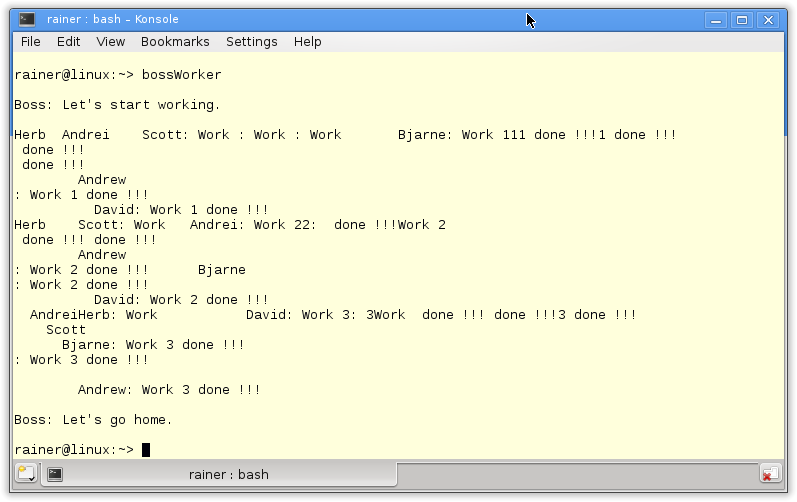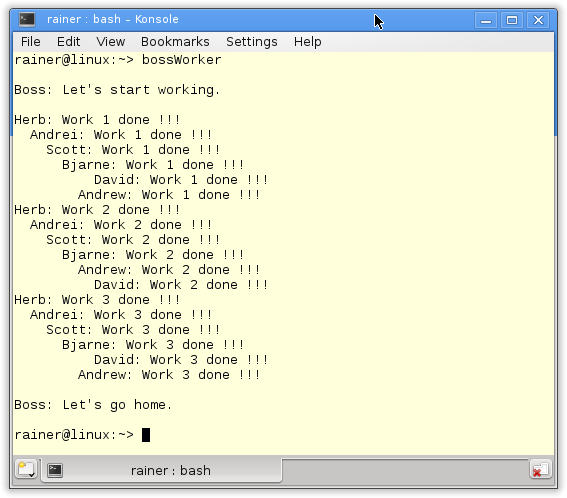Threads Sharing Data
One of the biggest challenges of thread management begins when the threads share non-const data
Data race and critical section
In threads using shared data, you often hear the expressions race condition and critical section. But what’s that?
- Data Race
- A data race is a state, in which at least two threads access shared data at the same time, and at least one of the threads is a writer.
- Critical Section
- A critical section is a section of the code, which not more than one thread should access at any point in time.
-
In case the program has a race condition, the program behavior is undefined. To say it differently, anything can happen.
A nice way to visualize a race condition is to let a few threads write to std::cout. std::cout is the shared object (output stream), that should be protected from simultaneous access by multiple threads.
1 2 3 4 5 6 7 8 9 10 11 12 13 14 15 16 17 18 19 20 21 22 23 24 25 26 27 28 29 30 31 32 33 34 35 36 37 38 39 40 41 42 43 44 45 46 47 48 49
// coutUnsynchronized.cpp #include <chrono> #include <iostream> #include <thread> class Worker{ public: Worker(std::string n):name(n){}; void operator() (){ for (int i= 1; i <= 3; ++i){ // begin work std::this_thread::sleep_for(std::chrono::milliseconds(200)); // end work std::cout << name << ": " << "Work " << i << " done !!!" << std::endl; } } private: std::string name; }; int main(){ std::cout << std::endl; std::cout << "Boss: Let's start working.\n\n"; std::thread herb= std::thread(Worker("Herb")); std::thread andrei= std::thread(Worker(" Andrei")); std::thread scott= std::thread(Worker(" Scott")); std::thread bjarne= std::thread(Worker(" Bjarne")); std::thread andrew= std::thread(Worker(" Andrew")); std::thread david= std::thread(Worker(" David")); herb.join(); andrei.join(); scott.join(); bjarne.join(); andrew.join(); david.join(); std::cout << "\n" << "Boss: Let's go home." << std::endl; std::cout << std::endl; }
The boss assigns three work packages (lines 11 – 17) to each of its six workers (lines 32 – 36). When a worker is done with their work package it screams out loudly to the boss (line 16). When the boss has gotten notifications from all workers, it sends them home (line 45).
What a mess!

 Modernes C++ Mentoring
Modernes C++ Mentoring- "Fundamentals for C++ Professionals" (open)
- "Design Patterns and Architectural Patterns with C++" (open)
- "C++20: Get the Details" (open)
- "Concurrency with Modern C++" (open)
- "Embedded Programming with Modern C++": (open)
- "Generic Programming (Templates) with C++": (open)
- "Clean Code: Best Practices for Modern C++": September 2025
Do you want to stay informed: Subscribe.
The same mess the next day. The workers scream out loudly. Totally unsynchronized.

-
The first solution is a mutex. A mutex ensures, that each thread exclusively accesses the shared variable std::cout.
A side note: std::cout is thread-safe
- The C++11 standard guarantees that you must not protect the single characters written to std::cout. Each character will atomically be written. Of course, it is possible that more output statements, like in the example, will interleave. But that is only an optical issue. The program is well-defined. The remark is valid for all input and output streams.
-
Mutex
Mutex stands for mutual exclusion. It ensures, that only one thread can access a critical section.
1 2 3 4 5 6 7 8 9 10 11 12 13 14 15 16 17 18 19 20 21 22 23 24 25 26 27 28 29 30 31 32 33 34 35 36 37 38 39 40 41 42 43 44 45 46 47 48 49 50 51
// coutSynchronized.cpp #include <chrono> #include <iostream> #include <mutex> #include <thread> std::mutex coutMutex; class Worker{ public: Worker(std::string n):name(n){}; void operator() (){ for (int i= 1; i <= 3; ++i){ // begin work std::this_thread::sleep_for(std::chrono::milliseconds(200)); // end work coutMutex.lock(); std::cout << name << ": " << "Work " << i << " done !!!" << std::endl; coutMutex.unlock(); } } private: std::string name; }; int main(){ std::cout << std::endl; std::cout << "Boss: Let's start working." << "\n\n"; std::thread herb= std::thread(Worker("Herb")); std::thread andrei= std::thread(Worker(" Andrei")); std::thread scott= std::thread(Worker(" Scott")); std::thread bjarne= std::thread(Worker(" Bjarne")); std::thread andrew= std::thread(Worker(" Andrew")); std::thread david= std::thread(Worker(" David")); herb.join(); andrei.join(); scott.join(); bjarne.join(); andrew.join(); david.join(); std::cout << "\n" << "Boss: Let's go home." << std::endl; std::cout << std::endl;
The key difference to the first example is lines 19 to 21. By invoking the methods coutMutex.lock() and coutMutex.unlock(); you define the exclusive section. This section can only be accessed by, at most, a single thread. The access to std::cout is synchronized, and the mess becomes harmonious.

What’s next?
Mutexes have a lot of issues, which I will discuss in the next post. (Proofreader Alexey Elymanov)
Thanks a lot to my Patreon Supporters: Matt Braun, Roman Postanciuc, Tobias Zindl, G Prvulovic, Reinhold Dröge, Abernitzke, Frank Grimm, Sakib, Broeserl, António Pina, Sergey Agafyin, Андрей Бурмистров, Jake, GS, Lawton Shoemake, Jozo Leko, John Breland, Venkat Nandam, Jose Francisco, Douglas Tinkham, Kuchlong Kuchlong, Robert Blanch, Truels Wissneth, Mario Luoni, Friedrich Huber, lennonli, Pramod Tikare Muralidhara, Peter Ware, Daniel Hufschläger, Alessandro Pezzato, Bob Perry, Satish Vangipuram, Andi Ireland, Richard Ohnemus, Michael Dunsky, Leo Goodstadt, John Wiederhirn, Yacob Cohen-Arazi, Florian Tischler, Robin Furness, Michael Young, Holger Detering, Bernd Mühlhaus, Stephen Kelley, Kyle Dean, Tusar Palauri, Juan Dent, George Liao, Daniel Ceperley, Jon T Hess, Stephen Totten, Wolfgang Fütterer, Matthias Grün, Ben Atakora, Ann Shatoff, Rob North, Bhavith C Achar, Marco Parri Empoli, Philipp Lenk, Charles-Jianye Chen, Keith Jeffery, Matt Godbolt, Honey Sukesan, bruce_lee_wayne, Silviu Ardelean, schnapper79, Seeker, and Sundareswaran Senthilvel.
Thanks, in particular, to Jon Hess, Lakshman, Christian Wittenhorst, Sherhy Pyton, Dendi Suhubdy, Sudhakar Belagurusamy, Richard Sargeant, Rusty Fleming, John Nebel, Mipko, Alicja Kaminska, Slavko Radman, and David Poole.
| My special thanks to Embarcadero |  |
| My special thanks to PVS-Studio |  |
| My special thanks to Tipi.build |  |
| My special thanks to Take Up Code |  |
| My special thanks to SHAVEDYAKS |  |
Modernes C++ GmbH
Modernes C++ Mentoring (English)
Rainer Grimm
Yalovastraße 20
72108 Rottenburg
Mail: schulung@ModernesCpp.de
Mentoring: www.ModernesCpp.org



Leave a Reply
Want to join the discussion?Feel free to contribute!